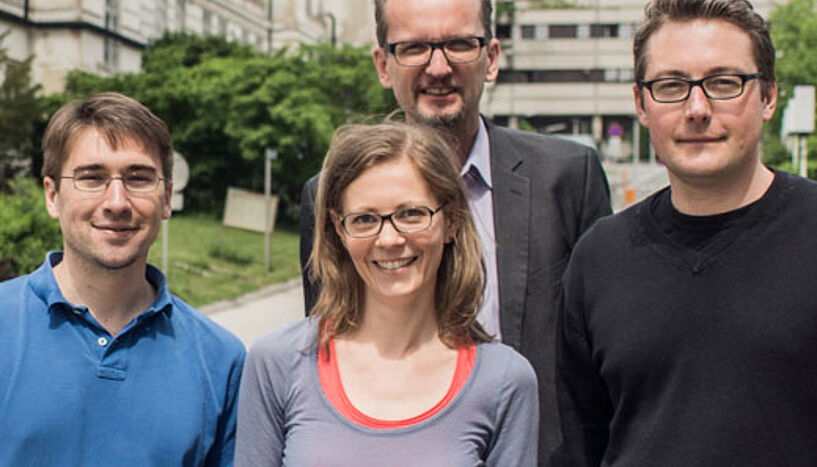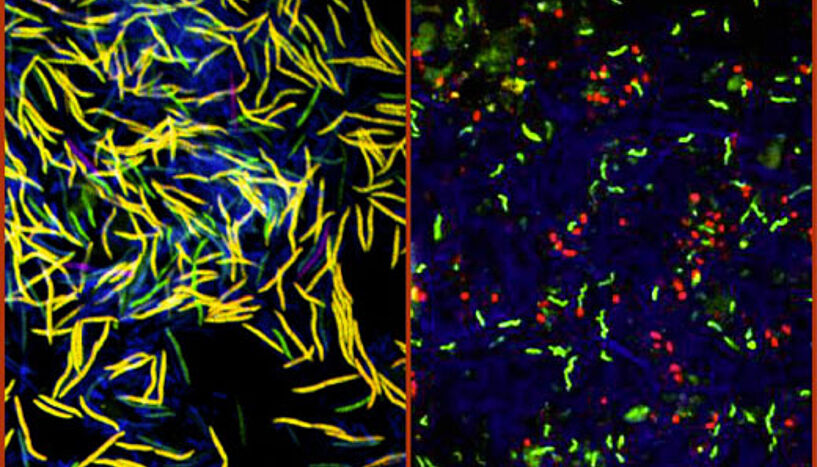Microbial restoration of the inflamed gut
30. September 2013Subtitle: Fecal transplantation as alternative therapy for a common disease?
A team led by gastroenterologists Sieglinde Angelberger and Walter Reinisch (Medical University Vienna) and microbiologists David Berry and Alexander Loy (University of Vienna) explored how a treatment called "fecal microbiota transplantation" can be used to support microbial recolonization of the gut of patients with chronic intestinal inflammation (ulcerative colitis). In this unusual alternative therapy the gut microbiota of healthy donors is transmitted to patients. The results of this pilot clinical study appear in the scientific journal "American Journal of Gastroenterology".
About two million people in Europe suffer from chronic inflammatory bowel diseases, which are characterized by progressive tissue destruction and that often necessitate removal of sections of the intestine. The exact causes of Crohn's disease and ulcerative colitis, the most common forms of these diseases, are still largely unknown. In addition to genetic and environmental as well as lifestyle factors, a disturbed intestinal microbiota is responsible for triggering the disease. Complete recovery is often not possible. "If drug therapies fail, removal of parts of the inflamed intestine is currently the last treatment option," said Walter Reinisch, a gastroenterologist at the University Clinic for Internal Medicine III, Medical University of Vienna, and initiator of the study.
Fecal transplantation: an alternative therapy with a certain “yuck” factor
The idea of the transfer of fecal matter naturally causes some disgust. However, in many infectious and chronic diarrheas the intestinal microbiota is massively disrupted and it is therefore fecal transplantation can be used to restore the natural intestinal microbiota and thereby improve disease state. "Meta studies have shown that the controlled grafting of fecal transplantation from healthy donors is a safe and very effective treatment of acute diarrheal diseases caused by the pathogenic bacterium Clostridium difficile," said Sieglinde Angelberger, gastroenterologist at the University Clinic for Internal Medicine III of the Medical University of Vienna and author of the study: "this was the reason why we applied this therapy for the treatment of patients with chronic intestinal diseases."
Successive colonization by donor intestinal bacteria
"So far, it has not been sufficiently tested whether and how successful fecal transplantation is for the permanent settlement of microbiota from a healthy donor to a patient," said Alexander Loy of the Department of Microbiology and Ecosystem Research, University of Vienna. "That is why we have followed the composition of the intestinal microbiota of patients using modern DNA sequencing methods over a period of up to three months after treatment."
The intestinal ecosystem of each individual patient reacted very differently to the fecal transplantation. Intestinal bacteria of the donors were detected in the patients, but at different times and in different frequencies. "Although we don’t know the mechanisms yet, repopulation of the gut by bacteria appears to analogous to succession in a forest after it is damaged in a storm," said microbiologist David Berry: "pioneer species colonize the deforested area, in this case the inflamed intestine, and alter the ecosystem in a way that lets other species colonize and eventually a complex ecosystem can be restored."
Cooperation between basic research and applied medicine
"Working with the Medical University of Vienna offered us an opportunity to translate fundamental science expertise from the project InflammoBiota to study the intestinal microbiota of patients," said Alexander Loy. The joint project InflammoBiota (http://gutmicrobiota.univie.ac.at/inflammobiota/), which was dedicated to the study of immunology and the microbial causes of inflammatory bowel disease, was funded by the Austrian Genome Research Programme GEN-AU (http://www.gen-au.at/) of the Federal Ministry for Science and Research.
Publication in American Journal of Gastroenterology
Temporal bacterial community dynamics vary among ulcerative colitis patients after fecal microbiota transplantation
By: Sieglinde Angelberger, Walter Reinisch, Athanasios Makristathis, Cornelia Lichtenberger, Clemens Dejaco, Pavol Papay, Gottfried Novacek, Michael Trauner, Alexander Loy and David Berry. In: American Journal of Gastroenteroloy (AJG), September 2013.
http://www.nature.com/ajg/journal/vaop/ncurrent/full/ajg2013257a.html
Participating Institutions
Division of Microbial Ecology, Department of Microbiology and Ecosystem Research, Faculty of Life Sciences, University of Vienna
Department of Clinical Microbiology and Division of Gastroenterology and Hepatology, Medical University of Vienna
Scientific contacts
Ass.-Prof. Dr. Alexander Loy
Division of Microbial Ecology
Department of Microbiology and Ecosystem Research
University of Vienna
Althanstrasse 14, 1090 Vienna
T +43-1-4277-76605
alexander.loy(at)univie.ac.at
Ass.-Prof. Dr. David Berry
Division of Microbial Ecology
Department of Microbiology and Ecosystem Research
University of Vienna
Althanstrasse 14, 1090 Vienna
T +43-1-4277-76612
david.berry(at)univie.ac.at
Clinical contacts
Ao.-Univ. Prof. Dr. Walter Reinisch
Department of Clinical Microbiology and Division of Gastroenterology and Hepatology
Medical University of Vienna.
Währinger Gürtel 18-20, 1090 Vienna
T +43-1-40400 4741
walter.reinisch(at)meduniwien.ac.at
Dr. Sieglinde Angelberger
Department of Clinical Microbiology and Division of Gastroenterology and Hepatology
Medical University of Vienna.
Währinger Gürtel 18-20, 1090 Vienna
T +43-1-40400 4741
sieglinde.angelberger(at)meduniwien.ac.at
Further inquiries
Mag. Alexandra Frey
Press office, University of Vienna
Research and Teaching
Universitätsring 1, 1010 Vienna
T +43-1-4277-175 33
M +43-664-602 77-175 33
alexandra.frey(at)univie.ac.at
Mag. Johannes Angerer
Head of Communications and Public Relations
Medical University of Vienna
Spitalgasse 23, 1090 Vienna
Tel.: +43 1 40 160 - 11 501
Fax: +43 1 40 160 911 500
Mobil: +43 664 800 16 11 501
johannes.angerer(at)meduniwien.ac.at
Wissenschaftlicher Kontakt
Univ.-Prof. Dipl.-Biol. Dr. Alexander Loy
Zentrum für Mikrobiologie und Umweltsystemwissenschaft, Department für Mikrobiologie und Ökosystemforschung, Division für Mikrobielle ÖkologieUniversität Wien
1090 - Wien, Althanstraße 14
+43 1-4277-766 05
alexander.loy@univie.ac.at
Rückfragehinweis
Mag. Alexandra Frey
Media Relations ManagerUniversität Wien
1010 - Wien, Universitätsring 1
+43-1-4277-17533
+43-664-8175675
alexandra.frey@univie.ac.at
Downloads:
Team_Loy_01.jpeg
Dateigröße: 1,19 MB
Loy_Darmmikrobiota_01.jpeg
Dateigröße: 344,44 KB


